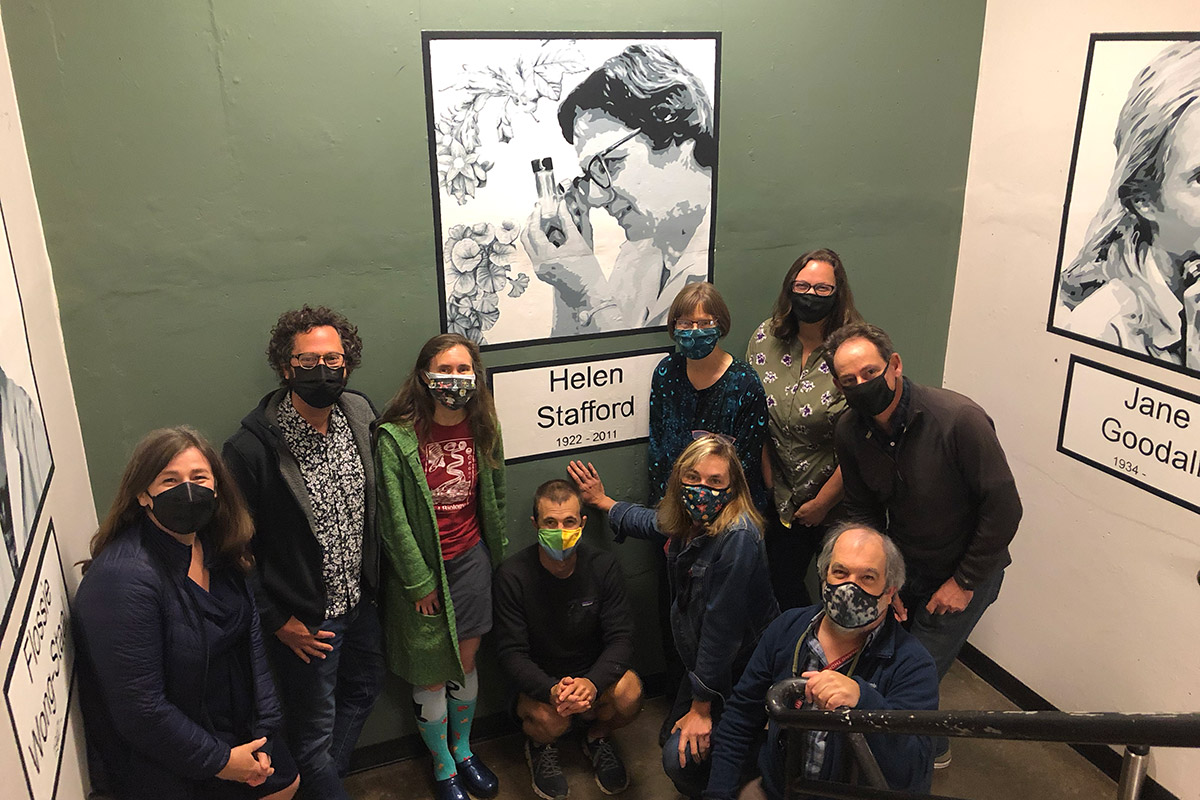Mural Honors Leading Reed Biologist
Prof. Helen Stafford joins pantheon of inspiring scientists in bio stairwell.
Trailblazing biologist and mentor Prof. Helen Stafford [biology 1954-87] has joined the pantheon of inspiring scientists who survey the north stairwell of the biology building, thanks to an art project undertaken by students and professors in the department.
Prof. Stafford, who died in 2011, was a research scientist of international renown. Known for her “incisive and truly creative” contributions to plant physiology, she authored the influential textbook Flavonoid Metabolism and more than 70 articles during her career. She was president of the Phytochemical Society of North America and served as a member of the editorial board of Plant Physiology for nearly 30 years.
Prof. Stafford also had an outsized influence on the biology department at Reed. Arriving on campus in 1954, she was the first female professor in the sciences, and for many years the only one. She was the first Reed professor to win a Guggenheim Fellowship and received uninterrupted funding for her research from the NSF for over 30 years. She also demonstrated how to combine research and teaching in a way that inspired generations of Reed students.
The seeds of the mural were sown in 2018, when bio major Avery Van Duzer ’18 and other students painted portraits of six inspiring scientists who embodied diversity in the north stairwell. Excited by the project, professors in the bio department wanted to add more. Prof. Suzy Renn proposed adding Prof. Stafford to the pantheon, to general acclaim. Prof. Janis Shampay tracked down old photos; the entire department participated in selecting an image that conveyed Prof. Stafford’s enthusiasm. Prof. Kara Cerveny, Erin Howell ’18, GenYuan Hu ’21, and visiting artist Jake Contino traced and painted the mural in spare moments over the course of several weeks.
“This project has been a wonderful experience,” says Prof. Cerveny. “We all got to learn more about Helen and how much she did for the department. And featuring scientists with diverse backgrounds has been a great way to create a sense of belonging for students in biology.”
Born in 1922 to a wealthy Philadelphia mill owner and his wife, Prof. Stafford was raised in a big house with servants. But her father lost his fortune when the stock market crashed in 1929. She won a scholarship to Wellesley College, earned a PhD at the University of Pennsylvania, and taught at the University of Chicago before coming to Reed, where she played a key role in shaping the biology department’s highly successful model combining cutting-edge research with dedicated teaching.
As a trailblazer who overcame the entrenched sexism and prejudice that was so commonplace in the scientific field, she was both mentor and role model to Reed students. “I have learned to appreciate how deeply students need encouragement, as well as, say, expertise,” she once said. “Typically required to work harder than ever before, expected to comprehend unfamiliar and often difficult subjects, obliged to compete with their peers for the first time, and usually subjected to severer criticisms than ever before, students deserve, not merely need, encouragement.”
“Helen was inspirational because she loved her work, and was interested in what her students were thinking about,” said UC-Davis plant pathologist Pamela Ronald ’82. “She was one of those professors who really gripped my imagination and made me believe in the power of the individual, that one person can make a difference.”
“Helen's engagement in her field and the strength of her professional reputation extended well past her retirement,” said Prof. Keith Karoly, recalling an episode in 2007 when he sought out an expert at Oregon State University to collaborate with a Reed student who wanted to investigate flavonoids. “Once the chemist at Oregon State learned I was from Reed, the door flew open. His own investigations of flavonoid chemistry had directly benefited from Helen's contributions.”
Living frugally, Prof. Stafford was able to bequeath an astonishing $8 million gift to Reed to support financial aid and summer fellowships for biology students. The gift endowed a scholarship named for her brother, Morton O. Stafford Jr, a gunner in the US Army Air Corps who was killed in action in World War II during a bombing raid in Romania.
As her last request, her ashes were scattered in Reed Lake.
Tags: Campus Life, Diversity/Equity/Inclusion, Giving Back to Reed, Institutional, Professors, Reed History, Research
